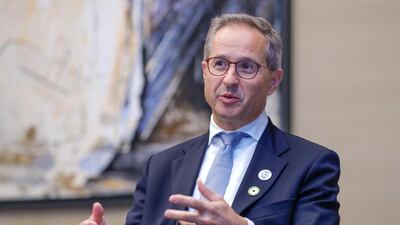Borealis, a Mubadala-owned chemicals player and co-owner of the UAE's biggest chemicals plant, is looking to scale up its business internationally through joint ventures with Adnoc in India and acquisitions of plastics recycling facilities in Europe, its chief executive said.
The Austrian company, which is the eighth-largest producer of polyethylene and polypropylene and has oil and gas firm OMV as a significant minority shareholder, is undergoing a large-scale expansion on the back of Adnoc's plans to increase refining and petrochemicals capacity at its refinery in Ruwais.
"What we wanted to do as a next step is, while continuing to strengthen the European and Ruwais base, we wanted to look at globalising," Borealis chief executive Alfred Stern told The National in Abu Dhabi.
In India, Borealis is partnering with European chemicals giant BASF, Adnoc and Indian conglomerate Adani Group to build a $4 billion chemicals complex, which will be powered entirely by renewable energy in the western Gujarat state. When completed, it will have propane dehydrogenation unit, with feedstock to be supplied by Abu Dhabi National Oil Company. The facility will produce propylene, which is key in the production of plastics, as well as other chemicals. Adnoc and Borealis will eventually produce polypropylene to serve the Indian market, with BASF and Adani looking to manufacture acrylics, said Mr Stern. A feasibility study on the project will be completed by the first quarter of next year, with the wind and solar power components already at an advanced stage of co-investment.
"To my knowledge, it would be the first petchems project that would be 100 per cent supplied with renewable electricity," said Mr Stern.
Elsewhere in Europe, the Austrian chemicals player, which moved into plastics recycling in 2016 with acquisition of Ecoplast Kunststoffrecycling is keen to pursue more opportunities in the field, as it looks for a more sustainable way to add capacity.
"We are for sure looking at growth opportunities in recycling," said Mr Stern.
"Since 2016, we have more than doubled our capacity, we've made a commitment and if we find opportunities faster, we'll do it faster," he added.
Borealis is working on a number of projects with Adnoc, with the latter planning investments of $45 billion (Dh165bn) with partners to develop its downstream sector as it looks to double its refining and treble its chemicals capacity by 2025, including plans to build the world's largest integrated refining and petrochemicals complex.
Borealis, through its Borouge petrochemicals joint venture with Adnoc, is undertaking two large-scale projects in Ruwais, including the development of the world's largest mixed-feed cracker and a fifth polypropylene unit. The planned expansion will see Borouge produce polyolefin products such as polyethylene and polypropylene as well as non-polyolefin products such as benzene and butadiene. The compounds find varied uses in packaging, plastics and acrylics industries.
"The project is making really good progress and by 2021 we would see an 11 per cent polyolefin capacity increase for the complex and with the polypropylene-5, we'll get to 5 million tonnes," said Mr Stern.
"As a next step we're looking at a mixed-feed cracker for Borouge 4, and in this, we are in the feed [Front-End Engineering Design] phase," he added.
Feed refers to basic engineering work that is carried out after the completion of conceptual design and feasibility studies.
The complex will produce around a total of 3.3 million tonnes of products, of which 2.5 million tonnes will be polyolefins, polyethylene, and polypropylene, said Mr Stern.
"We'll come to a final investment decision in 2020 so this is a huge complex," he added.


